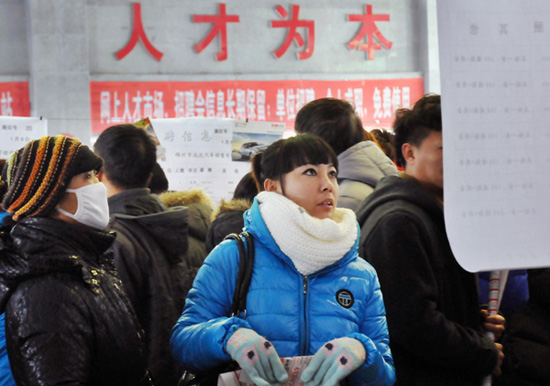
 |
| A job fair organized by human resources and social security authorities is packed with job seekers in Jinzhou, Liaoning province, on Tuesday. [Photo/China Daily] |
China tops any other Asia-Pacific market in its number of companies that plan to hire more employees, a report says.
Nearly 56 percent of organizations interviewed for a report by the global human resources company Hudson, said they plan to increase the number of permanent staff in the first quarter of 2013.
The enthusiasm to hire comes amid the recovery in the growth of the Chinese economy and an increasing number of multinationals moving their regional headquarters to China, said Lily Bi, general manager of Hudson Shanghai.
The salaries offered to talented workers will also increase, Bi said.
"International giants and local companies are attaching more importance to research and development work. Therefore, talented professionals have plenty of opportunities, especially in the pharmaceutical and automotive industries," said Bi, stressing that higher salaries offered to sought-after workers is another trend taking shape in the Chinese job market.
Multinational companies moving their headquarters to China, Shanghai especially, have also helped to create more jobs.
According to statistics provided by the Shanghai Municipal Commission of Commerce, as of September 2012, around 60 multinational companies had Asia-Pacific or Asian headquarters in Shanghai.
The pharmaceutical and biologics company AstraZeneca moved its Asia-Pacific headquarters from Singapore to Shanghai in June. McDonald's and Ikea have also moved their Asia-Pacific headquarters to Shanghai.
Although its economic growth slowed in 2012, China is still the second-largest economy in the world. The central government forecast that the country's GDP will grow by 7.5 percent in 2013 and its unemployment rate will remain stable at around 4 percent.
China is now the world's fastest-growing automobile market and skilled professionals are needed to sustain expansion, particularly in smaller cities. Salary packages are becoming more streamlined and bonuses are down, but candidates are ambitious and looking for increments of up to 25 to 30 percent to switch roles, the report said.
Guo Yating, 32, with three years of experience as an automotive research and development engineer, moved to AVL, an Austrian-based automotive consulting firm, in December with a 50 percent salary increase and a 10-day extension of annual leave to 15 days.
"Frankly speaking, the chances were far scarcer in 2011 and 2012 when the economy, especially the manufacturing industry, was pretty lousy. It was quite difficult for fresh graduates to get a job. But on the contrary, R&D engineers with experience have been receiving more enquires from headhunters in the previous two years," Guo said.
Bi from Hudson said salary increases will also be offered to people working in newly opened positions, even though they are in older sectors such as the advertising industry.
"Employees with expertise in digital and new media, e-commerce and social media may receive increments of up to 20 percent," she said.
Li Daifei, 28, a project manager at a Shanghai-based advertisement agency, was offered her current job at the end of 2012, which saw her salary rise by 40 percent. Her experience with digital media helped her make the switch.
Related Readings:
Why the highly educated not popular anymore
Wang Lina, postgraduate student, thought she can easily find a good job. However, she was turned down by employers because of her post-graduate background.[Read More]
Related Photos:
What makes postgraduate entrance exam so popular?
1.8 mln to site 2013 postgraduate addmission exams














 1.8 million students have taken NEEP. What motivate them to continue study rather than work?
1.8 million students have taken NEEP. What motivate them to continue study rather than work?


![]()
